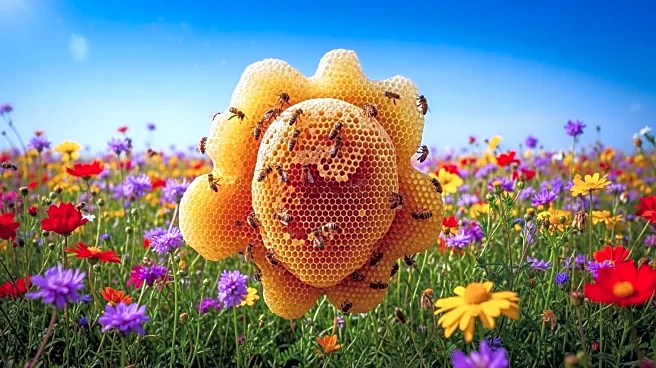What is the story about?
What's Happening?
Researchers at the University of Oxford have engineered a yeast-based food supplement that significantly enhances honeybee colony growth. The supplement mimics the sterol profile found in natural pollen, providing bees with essential nutrients that are often missing in commercial substitutes. During a three-month feeding trial conducted in enclosed glasshouses, colonies fed with the sterol-enriched yeast showed a 15-fold increase in larvae reared to the viable pupal stage compared to those on control diets. The study highlights the potential of this supplement to address the decline in bee populations by offering a nutritionally complete diet.
Why It's Important?
The decline in bee populations poses a significant threat to global food security, as bees play a crucial role in pollinating crops. The development of a nutritionally complete supplement could help reverse this trend, ensuring the sustainability of bee colonies and, by extension, the agricultural industry. This breakthrough offers a promising solution to the challenges faced by beekeepers and farmers, potentially stabilizing food production and biodiversity. The ability to mimic natural pollen's sterol profile is a key advancement, as it ensures bees receive the nutrients necessary for healthy colony growth.
What's Next?
Further research and trials are likely needed to assess the long-term effects of the supplement on bee health and reproduction. If successful, the supplement could be commercialized and distributed to beekeepers globally, providing a tool to combat bee population decline. Stakeholders in agriculture and environmental conservation may advocate for the adoption of this technology, potentially influencing policy and funding for bee conservation efforts.
Beyond the Headlines
The ethical implications of genetically engineering food sources for bees may spark debate among environmentalists and scientists. While the supplement offers a solution to bee decline, it raises questions about the impact of human intervention in natural ecosystems. Long-term studies will be essential to understand the ecological consequences and ensure that the supplement does not disrupt existing biodiversity.















